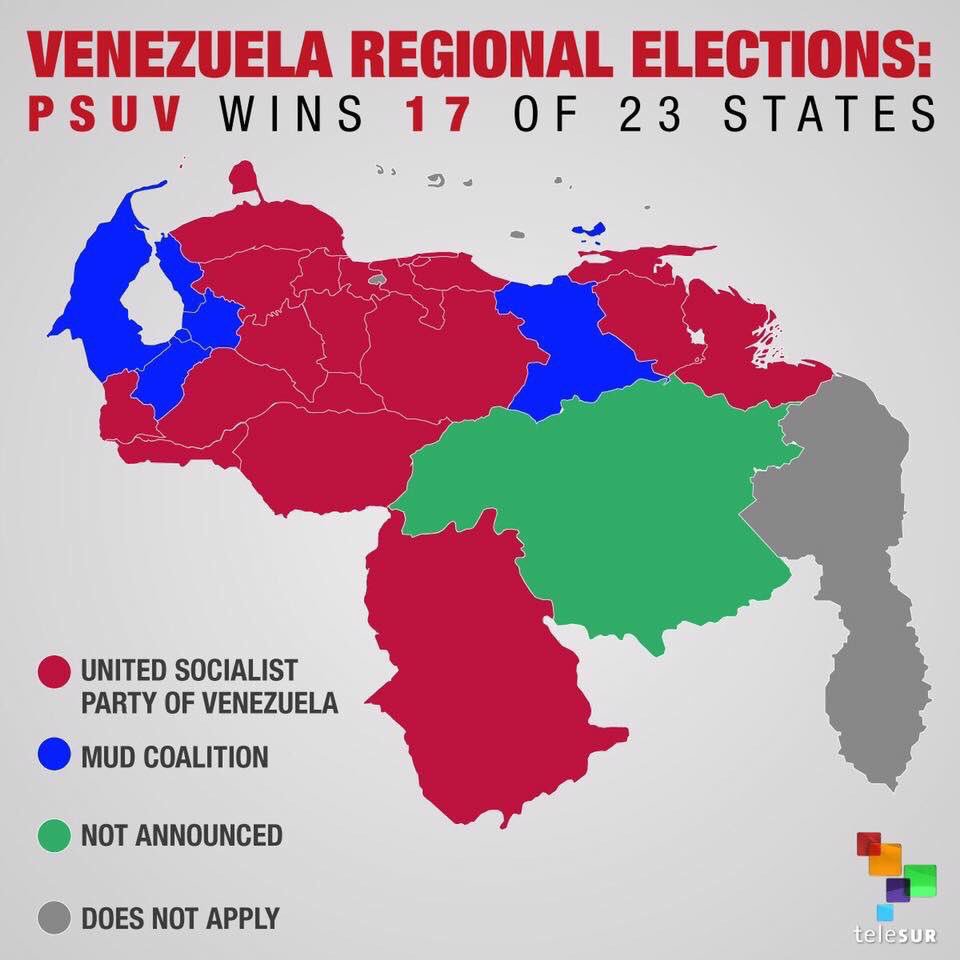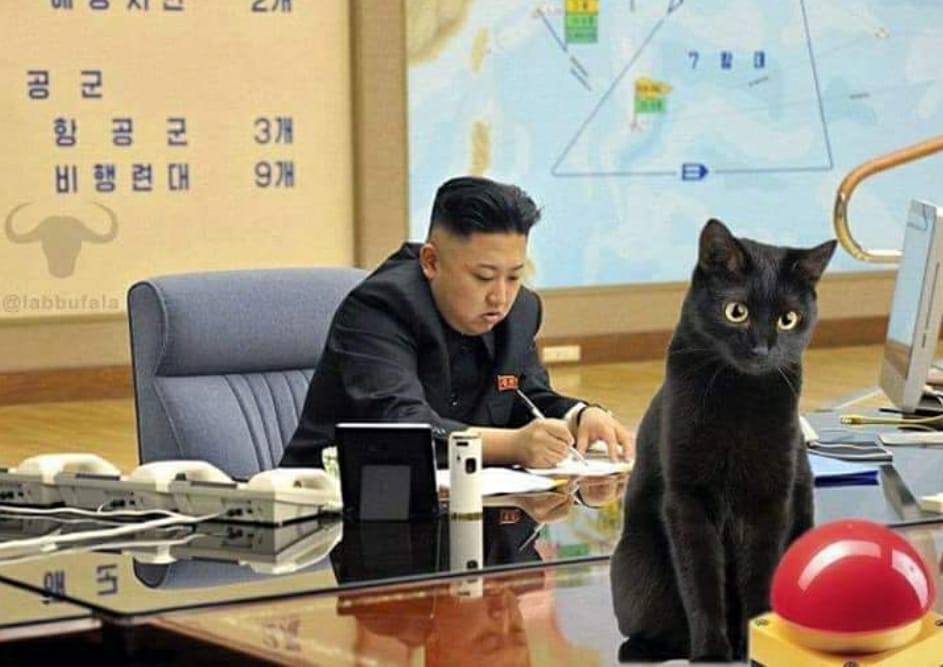You are using an out of date browser. It may not display this or other websites correctly.
You should upgrade or use an alternative browser.
You should upgrade or use an alternative browser.
N. Korea, Cuba, Venezuela, Iran, the Vatican news
- Thread starter Just_another_day_at_work
- Start date
Sportello
Well-Known Member
Sportello
Well-Known Member
Glenn GreenwaldVerified account @ggreenwald 2h2 hours ago
Is it time to consider sanctions against Madrid? Or is that kind of response only for repressive non-western governments?
Is it time to consider sanctions against Madrid? Or is that kind of response only for repressive non-western governments?
dont really know what this means other than perhaps they voted for the same party again because they are pleased with them. im not familiar with their system.
Mike Prysner @MikePrysner 43m43 minutes ago
Now we know why #Venezuela opposition & MUD wanted street riots instead of regional elections

Mike Prysner @MikePrysner 43m43 minutes ago
Now we know why #Venezuela opposition & MUD wanted street riots instead of regional elections

Venezuela's Nicolas Maduro defends Sunday's vote
The results amounted to a crushing blow for the opposition Democratic Union Roundtable (MUD) coalition, which had characterised the elections as a referendum on Maduro after months of deadly street protests earlier this year failed to unseat him.
The results amounted to a crushing blow for the opposition Democratic Union Roundtable (MUD) coalition, which had characterised the elections as a referendum on Maduro after months of deadly street protests earlier this year failed to unseat him.
moreluck
golden ticket member
Someone needs to wipe that grin off his face!!!!!
Babagounj
Strength through joy
The Time Has Come: Venezuela May Be In Default In Under 48 Hours
This past weekend, Venezuela failed to make $237 million in bond coupon payment, blaming “technical glitches” when in reality it simply did not have the money (or wish to part with it).
Adding the $349 million in unpaid bond interest accumulated over the past month as of last Friday, that brings Caracas’ unpaid bills to $586 million this month, just days before the nation must make a critical principal payment. And, as BofA sovereign debt analyst Jane Brauer writes, while the bank’s base case assumption is that Venezuela will make its debt service payments this year, “the probability of a short term default has increased substantially with coupon delays” and it could come as soon as this Friday, when an $842 million PDVSA principal plus interest payment is due, and which unlike typical bond payments does not have a 30 day grace period but instead is followed by a second $1.1 billion PDVSA coupon on Nov 2, also without a 30 day grace period.
Venezuela has been in as similar situation of payment uncertainty in the recent past, with bond prices plummeting right before a big payment. For example, just before a big principal payment was due in April 2017 Venezuela received a $1bn loan from Russia just one week before the due date. At that time Ven 27s dropped 16% in a month (from $52 to $45) and recovered completely within a month. Ven 27 has fallen to $35, as Venezuela has demonstrated that it will be a challenge to make all payments on time. The difference between now and April is that coupon payment delays then came after, not before the payment.
This past weekend, Venezuela failed to make $237 million in bond coupon payment, blaming “technical glitches” when in reality it simply did not have the money (or wish to part with it).
Adding the $349 million in unpaid bond interest accumulated over the past month as of last Friday, that brings Caracas’ unpaid bills to $586 million this month, just days before the nation must make a critical principal payment. And, as BofA sovereign debt analyst Jane Brauer writes, while the bank’s base case assumption is that Venezuela will make its debt service payments this year, “the probability of a short term default has increased substantially with coupon delays” and it could come as soon as this Friday, when an $842 million PDVSA principal plus interest payment is due, and which unlike typical bond payments does not have a 30 day grace period but instead is followed by a second $1.1 billion PDVSA coupon on Nov 2, also without a 30 day grace period.
Venezuela has been in as similar situation of payment uncertainty in the recent past, with bond prices plummeting right before a big payment. For example, just before a big principal payment was due in April 2017 Venezuela received a $1bn loan from Russia just one week before the due date. At that time Ven 27s dropped 16% in a month (from $52 to $45) and recovered completely within a month. Ven 27 has fallen to $35, as Venezuela has demonstrated that it will be a challenge to make all payments on time. The difference between now and April is that coupon payment delays then came after, not before the payment.
hard to believe US has a higher poverty rate than North Korea..america is a very  ed up country tho.
ed up country tho.
Mike Prysner @MikePrysner 17h17 hours ago
Tillerson threats at the UN today: “North Koreans are living in poverty—the government could care for them if it didn’t spend so much on their military” The US has a higher poverty rate than the DPRK, and way higher percent of US spending goes to our crazy military budget.
 ed up country tho.
ed up country tho.Mike Prysner @MikePrysner 17h17 hours ago
Tillerson threats at the UN today: “North Koreans are living in poverty—the government could care for them if it didn’t spend so much on their military” The US has a higher poverty rate than the DPRK, and way higher percent of US spending goes to our crazy military budget.
Babagounj
Strength through joy
The secret backstory of how Obama let Hezbollah off the hook
The campaign, dubbed Project Cassandra, was launched in 2008 after the Drug Enforcement Administration amassed evidence that Hezbollah had transformed itself from a Middle East-focused military and political organization into an international crime syndicate that some investigators believed was collecting $1 billion a year from drug and weapons trafficking, money laundering and other criminal activities.
Over the next eight years, agents working out of a top-secret DEA facility in Chantilly, Virginia, used wiretaps, undercover operations and informants to map Hezbollah’s illicit networks, with the help of 30 U.S. and foreign security agencies.
They followed cocaine shipments, some from Latin America to West Africa and on to Europe and the Middle East, and others through Venezuela and Mexico to the United States. They tracked the river of dirty cash as it was laundered by, among other tactics, buying American used cars and shipping them to Africa. And with the help of some key cooperating witnesses, the agents traced the conspiracy, they believed, to the innermost circle of Hezbollah and its state sponsors in Iran.
But as Project Cassandra reached higher into the hierarchy of the conspiracy, Obama administration officials threw an increasingly insurmountable series of roadblocks in its way, according to interviews with dozens of participants who in many cases spoke for the first time about events shrouded in secrecy, and a review of government documents and court records. When Project Cassandra leaders sought approval for some significant investigations, prosecutions, arrests and financial sanctions, officials at the Justice and Treasury departments delayed, hindered or rejected their requests.
The Justice Department declined requests by Project Cassandra and other authorities to file criminal charges against major players such as Hezbollah’s high-profile envoy to Iran, a Lebanese bank that allegedly laundered billions in alleged drug profits, and a central player in a U.S.-based cell of the Iranian paramilitary Quds force. And the State Department rejected requests to lure high-value targets to countries where they could be arrested.
The campaign, dubbed Project Cassandra, was launched in 2008 after the Drug Enforcement Administration amassed evidence that Hezbollah had transformed itself from a Middle East-focused military and political organization into an international crime syndicate that some investigators believed was collecting $1 billion a year from drug and weapons trafficking, money laundering and other criminal activities.
Over the next eight years, agents working out of a top-secret DEA facility in Chantilly, Virginia, used wiretaps, undercover operations and informants to map Hezbollah’s illicit networks, with the help of 30 U.S. and foreign security agencies.
They followed cocaine shipments, some from Latin America to West Africa and on to Europe and the Middle East, and others through Venezuela and Mexico to the United States. They tracked the river of dirty cash as it was laundered by, among other tactics, buying American used cars and shipping them to Africa. And with the help of some key cooperating witnesses, the agents traced the conspiracy, they believed, to the innermost circle of Hezbollah and its state sponsors in Iran.
But as Project Cassandra reached higher into the hierarchy of the conspiracy, Obama administration officials threw an increasingly insurmountable series of roadblocks in its way, according to interviews with dozens of participants who in many cases spoke for the first time about events shrouded in secrecy, and a review of government documents and court records. When Project Cassandra leaders sought approval for some significant investigations, prosecutions, arrests and financial sanctions, officials at the Justice and Treasury departments delayed, hindered or rejected their requests.
The Justice Department declined requests by Project Cassandra and other authorities to file criminal charges against major players such as Hezbollah’s high-profile envoy to Iran, a Lebanese bank that allegedly laundered billions in alleged drug profits, and a central player in a U.S.-based cell of the Iranian paramilitary Quds force. And the State Department rejected requests to lure high-value targets to countries where they could be arrested.
floridays
Well-Known Member
Lotta men died over a patch of hair.how did the great nuke war start?

DriveInDriѵeOut
Inordinately Right
As a distraction from a falling stock market.how did the great nuke war start?
brownmonster
Man of Great Wisdom
To combat the rising cost of living the government raised the minumum wage to $1 a month.
Babagounj
Strength through joy
Worthless currency becomes art, of sorts, in struggling Venezuela
Venezuela's currency has lost so much value that people simply throw away their small bills -- they are virtually worthless anyway.
Enter Wilmer Rojas, 25, who scoops them up off the street, uses an origami-like folding technique, a needle and thread to make handbags with an eye to selling them -- maybe even abroad, where people have real money.
Rojas can use as many as 800 bills to make such a purse. And if you add up the face value of all that money, it's enough to buy... half a kilo (one pound) of rice. Rojas and his wife have three kids to feed, and another is on the way.
"People throw them away because they are no good to buy anything. No one even accepts them anymore," Rojas told AFP outside a subway station, where he also sells coffee and cigarettes in addition to his unusual bag-weaving work.
Venezuela's currency has lost so much value that people simply throw away their small bills -- they are virtually worthless anyway.
Enter Wilmer Rojas, 25, who scoops them up off the street, uses an origami-like folding technique, a needle and thread to make handbags with an eye to selling them -- maybe even abroad, where people have real money.
Rojas can use as many as 800 bills to make such a purse. And if you add up the face value of all that money, it's enough to buy... half a kilo (one pound) of rice. Rojas and his wife have three kids to feed, and another is on the way.
"People throw them away because they are no good to buy anything. No one even accepts them anymore," Rojas told AFP outside a subway station, where he also sells coffee and cigarettes in addition to his unusual bag-weaving work.
